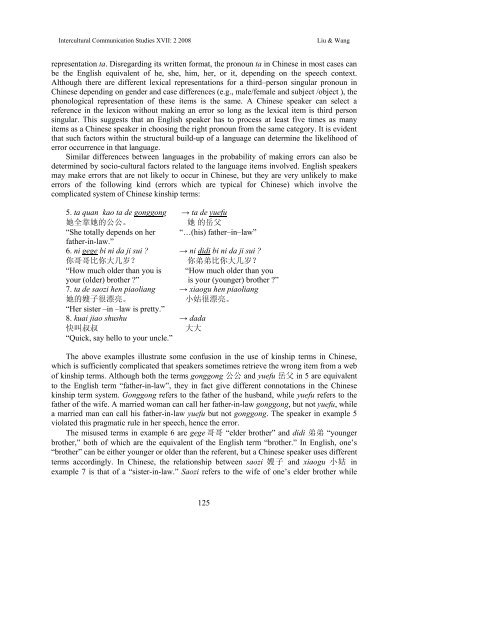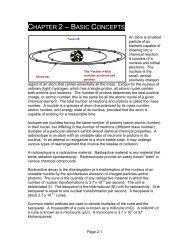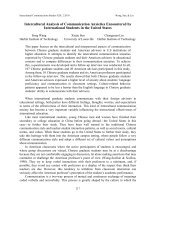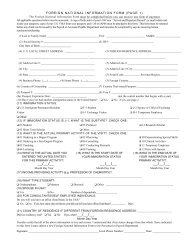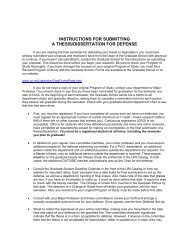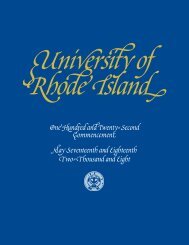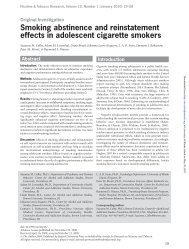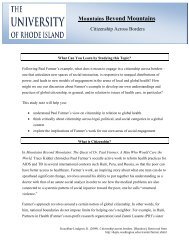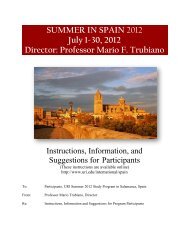Socio-cultural Impacts on Communication Slips
Socio-cultural Impacts on Communication Slips
Socio-cultural Impacts on Communication Slips
Create successful ePaper yourself
Turn your PDF publications into a flip-book with our unique Google optimized e-Paper software.
Inter<str<strong>on</strong>g>cultural</str<strong>on</strong>g> Communicati<strong>on</strong> Studies XVII: 2 2008 Liu & Wang<br />
representati<strong>on</strong> ta. Disregarding its written format, the pr<strong>on</strong>oun ta in Chinese in most cases can<br />
be the English equivalent of he, she, him, her, or it, depending <strong>on</strong> the speech c<strong>on</strong>text.<br />
Although there are different lexical representati<strong>on</strong>s for a third–pers<strong>on</strong> singular pr<strong>on</strong>oun in<br />
Chinese depending <strong>on</strong> gender and case differences (e.g., male/female and subject /object ), the<br />
ph<strong>on</strong>ological representati<strong>on</strong> of these items is the same. A Chinese speaker can select a<br />
reference in the lexic<strong>on</strong> without making an error so l<strong>on</strong>g as the lexical item is third pers<strong>on</strong><br />
singular. This suggests that an English speaker has to process at least five times as many<br />
items as a Chinese speaker in choosing the right pr<strong>on</strong>oun from the same category. It is evident<br />
that such factors within the structural build-up of a language can determine the likelihood of<br />
error occurrence in that language.<br />
Similar differences between languages in the probability of making errors can also be<br />
determined by socio-<str<strong>on</strong>g>cultural</str<strong>on</strong>g> factors related to the language items involved. English speakers<br />
may make errors that are not likely to occur in Chinese, but they are very unlikely to make<br />
errors of the following kind (errors which are typical for Chinese) which involve the<br />
complicated system of Chinese kinship terms:<br />
5. ta quan kao ta de g<strong>on</strong>gg<strong>on</strong>g → ta de yuefu<br />
她全靠她的公公。 她 的岳父<br />
“She totally depends <strong>on</strong> her “…(his) father–in–law”<br />
father-in-law.”<br />
6. ni gege bi ni da ji sui ? → ni didi bi ni da ji sui ?<br />
你哥哥比你大几岁? 你弟弟比你大几岁?<br />
“How much older than you is “How much older than you<br />
your (older) brother ?” is your (younger) brother ?”<br />
7. ta de saozi hen piaoliang → xiaogu hen piaoliang<br />
她的嫂子很漂亮。 小姑很漂亮。<br />
“Her sister –in –law is pretty.”<br />
8. kuai jiao shushu → dada<br />
快叫叔叔 大大<br />
“Quick, say hello to your uncle.”<br />
The above examples illustrate some c<strong>on</strong>fusi<strong>on</strong> in the use of kinship terms in Chinese,<br />
which is sufficiently complicated that speakers sometimes retrieve the wr<strong>on</strong>g item from a web<br />
of kinship terms. Although both the terms g<strong>on</strong>gg<strong>on</strong>g 公公 and yuefu 岳父 in 5 are equivalent<br />
to the English term “father-in-law”, they in fact give different c<strong>on</strong>notati<strong>on</strong>s in the Chinese<br />
kinship term system. G<strong>on</strong>gg<strong>on</strong>g refers to the father of the husband, while yuefu refers to the<br />
father of the wife. A married woman can call her father-in-law g<strong>on</strong>gg<strong>on</strong>g, but not yuefu, while<br />
a married man can call his father-in-law yuefu but not g<strong>on</strong>gg<strong>on</strong>g. The speaker in example 5<br />
violated this pragmatic rule in her speech, hence the error.<br />
The misused terms in example 6 are gege 哥哥 “elder brother” and didi 弟弟 “younger<br />
brother,” both of which are the equivalent of the English term “brother.” In English, <strong>on</strong>e’s<br />
“brother” can be either younger or older than the referent, but a Chinese speaker uses different<br />
terms accordingly. In Chinese, the relati<strong>on</strong>ship between saozi 嫂子 and xiaogu 小姑 in<br />
example 7 is that of a “sister-in-law.” Saozi refers to the wife of <strong>on</strong>e’s elder brother while<br />
125


